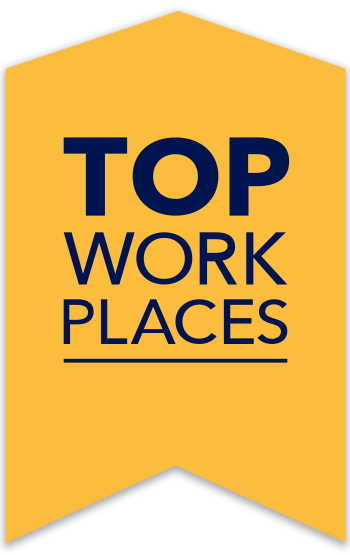Recruitment plays a pivotal role in an organization’s ability to stand out in a competitive market and achieve successful growth. Keeping up to date with current recruitment trends is an essential part of that effort, especially as we look ahead to the future of work in 2021 and beyond.
In a world forever changed by a global pandemic, an effective employee recruitment and retention strategy is more critical than ever. Here are nine ways to keep pace with new recruitment trends.
1. Artificial intelligence and natural language processing
When it comes to the future of recruiting, Artificial Intelligence (AI) and Natural Language Processing (NLP) are quickly becoming a vital part of the sourcing and screening process. Using these tools in the recruitment phase is a great way to show talented candidates that your organization is forward-thinking.
AI can help HR identify top prospects, streamline the hiring process, and accelerate response time. NLP software effectively scans resumes, analyzes employee survey insights, and establishes a quick-response line of communication.
2. Predictive analytics
Predictive analytics is another way to improve and fine-tune your recruitment efforts. Using current and year-over-year data and insights captured by the employee engagement survey is one example. Understanding why your employees are motivated, productive, and loyal can help you find like-minded candidates who will stay with your company for the long term.
While predictive analytics can help organizations find the best candidates and boost retention efforts, it’s only one part of the equation. The human element and the actions management takes based on that data play an equally essential role in your recruiting trends.
Fusion Alliance, a multi-year Top Workplaces national and regional winner, leverages employee feedback to survey and identify employee frustration that could be a turnoff for job seekers. The data pointed to an issue with their PTO policy that led management to re-evaluate and make a change to help strengthen employee satisfaction and retention.
3. Remote work and flexible work policies
Remote work was a popular trend long before COVID-19 hit. Still, companies were pleasantly surprised when they were forced to adopt flexible work policies during the pandemic. For many, productivity and employee engagement remained high.
The future of recruiting is sure to reflect this change as more and more talented applicants are looking for organizations that offer remote work options. Flexibility in the workplace enables recruiters to expand their reach to new talent pools. It also demonstrates that management is willing to respond to employees and support what matters most to them.
4. Virtual hiring
While virtual hiring was growing in popularity before 2020, the pandemic accelerated the adoption of this trend. According to a recent LinkedIn survey, 70 percent of respondents indicated that this trend is likely to become standard practice moving forward.
Virtual hiring eliminates geographic limitations to expand the talent pool for companies. As a result, it enables them to hire better talent more quickly. Using video interviews has additional benefits, including a shorter time to hire, reduced bias risk, and the ability to capture qualitative data.
5. Diversity, equity, and inclusion
With a heightened awareness of diversity, equity, and inclusion this past year, recruiting trends have already begun to shift toward better hiring practices. Companies are considering what many studies have already shown – that diverse workplaces perform better overall.
The way companies write and advertise job postings has shifted. Today, there is a focus on language, targeting specific communities, and staffing agencies that focus on diversity.
But efforts to diversify your organization need to go beyond an applicant’s identity. Companies also need to consider candidates who think outside the box and push their organizations to do better.
6. Candidate experience and candidate relationship management
A candidate’s perception of your organization is established during the interview process. Top talent is looking for an organization that cares about them as individuals and is willing to go the extra mile to make the recruitment process a positive experience.
A negative interaction can have lasting consequences for your company, especially when candidates spread the word or write an online review. At the same time, a positive experience can elevate your company’s recruitment and retention efforts.
Recruiting strategies rely heavily on virtual interviews, especially now. This is likely to continue as a trend and expectation, especially when geographically dispersed candidates explore open positions with your organization.
Learn more: How to Improve Your Recruitment Process
7. Enhanced vetting
Vetting helps organizations find talented candidates, improve the effectiveness of employee recruitment and retention efforts, and minimize unwanted turnover.
Save valuable time during the multi-level interview process by deploying ways to quickly identifying if a candidate is aligned with your company’s culture and values. In the future, we will see the inclusion of enhanced vetting features that enable organizations to assess job candidate skills and learn how candidates tackle challenges.
8. Workplace culture
Building and sustaining a people-first company culture is how Top Workplaces build a solid foundation to attract and retain employees during challenging times.
As we move into the post-pandemic phase and consider the new world of work, companies see the need to rethink the importance of employee retention and how to improve company culture to fit the new environment. Pay attention to remote employee engagement, especially now.
9. Employer Branding and Recognition
Just as a strong consumer brand attracts new customers, a strong employer brand attracts new talent. Companies that invest in employer branding are three times more likely to hire quality candidates. That’s why employer brand is one of the top-five concerns of talent acquisition professionals.
Similarly, job candidates are three times more likely to trust what employees say than what the company advertises. Engaged employees can be your biggest advocates and champions. They bring their best to work each day, are committed to your organization, and are willing to recommend your company to others. Utilizing their voices and feedback will help you to build a credible and authentic brand.
Earning employer recognition awards is another way to leverage your employee’s voices to strengthen your employer brand. Top Workplaces is an example of a trusted employer recognition program.
The coveted gold badge is a symbol of credibility and authenticity because the award is based entirely on employee feedback. In addition to high-profile media exposure, displaying Top Workplaces awards is a careers page best practice that helps companies to stand out from the competition, attract top talent, and showcase a people-first culture.

